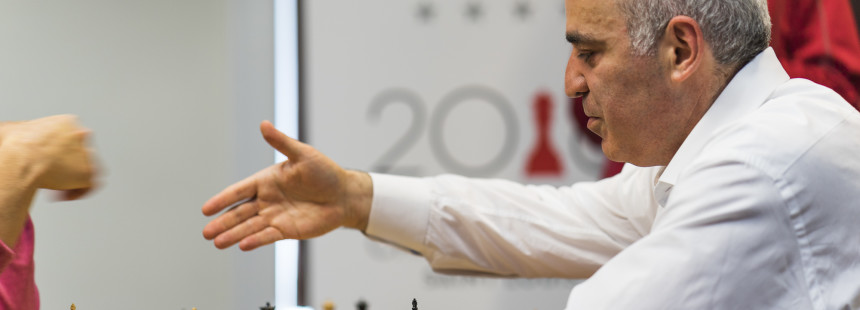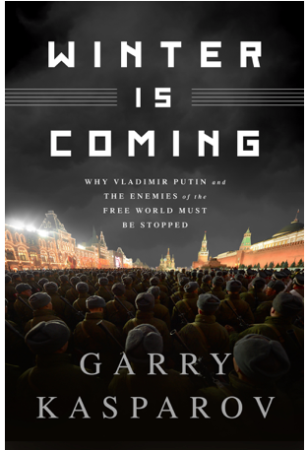

By Davis Richardson •
04/27/18
READ ORIGINAL ARTICLE AT OBSERVER.COM
Chess wizard Garry Kasparov is advising a neo-conservative challenging Vladimir Putin’s favorite congressman, Dana Rohrabacher (R-Calif.), during this year’s midterm elections.
After attending Manhattan’s first ever “PutinCon”—a gathering organized last March by Kasparov alongside other leading Russian dissidents—longshot GOP congressional candidate Paul Martin walked away with the grandmaster’s blessing.
“We were very pleased to see someone who was challenging Rohrabacher who was one of the “heroes,’” Kasparov told Observer during a phone interview. “Very few people understand the real threat coming from Putin to America and the free world at large.”
“There’s a fog around a lot of Republicans over what’s really going on,” added Martin on the threat posed by Putin’s regime. “I see this as the single greatest crisis our nation’s facing, and I see Rohrabacher very clearly as somebody on Putin’s side who has been a supporter and lobbyist for his agenda.”
As world leaders and U.S. intelligence agencies condemn Moscow en masse—for influencing elections, approving extrajudicial assassinations on foreign soil and supporting dictators in Middle East geopolitics—Rohrabacher’s tenure in Washington has been recast in the Soviet 2.0 lens.
The Senate Intelligence Committee interviewed Rohbrabacher extensively over multiple trips to Russia and a meeting with Wikileaks founder Julian Assange in London ahead of the 2016 election. For years, the congressman opposed the Magnitsky Act, legislation passed by Congress intended to curb human rights violations after the murder of a Russian dissident, and benefited from an April fundraiser hosted by Blackwater founder Erik Prince, who himself is under investigation for allegedly establishing a backchannel between the Trump campaign and Moscow.
“Looking at Rohrbacher’s records, we can find he made statements defending Putin’s aggressive policies in 2008,” explained Kasparov. “He was the only American politician who blatantly blamed the Republic of Georgia for attacking Russia and exonerating Putin from his aggressive act…him being compromised or having significant interest in supporting Putin are two rational explanations that come to mind.”
“Best case is that Rohrabacher is so wrapped up in Russia and Putin that he’s ignoring those kitchen table issues in the district,” said Martin. “Worst case, he’s fully compromised and is some kind of Russian agent.”
Players in Orange County’s jungle primary to dethrone Rohrabacher include a pioneer of stem cell research, a former Nestle head and a Google executive-turned-global humanitarian. All question Rohrabacher’s ties to Putin, but none transformed the Russia question into the defining theme of their campaign like Martin. The candidate’s eagerness to tumble with Moscow, through his own turf in California, sparked a joint event with Kasparov in Washington, D.C. earlier this week, where both figures discussed Russian disinformation tactics and Putin’s grand strategy.
“I don’t think Putin had a clear agenda: It’s more about spreading chaos. Putin, unlike other ideologues, is not selling just one ideology for you to buy in and believe in,” said Kasparov. “He’s very good in spreading, not even lies, but rumors and stories and trying to convince you that truth cannot be known.”
“He’s trying to undermine the values that were the core of successful countries,” the chess grandmaster continued, citing the dissemination of the Soviet Empire as a time when the free world allowed Putin’s regime to rise. “Unfortunately, there’s quite an irony, where new technology and modern means of communication were invented in the free world and are now being used by Putin and alike to undermine the political foundation of the free world.”
The attempted assassination of a former Russian spy in London, which subsequently sparked a tit-for-tat expulsion of diplomats and diplomatic crises, galvanized collective action against Putin’s regime. Sensing an awakening in public perception, Kasparov is playing his own chess game against the Kremlin involving education and dialogue.
Still, he worries that what happened in London may happen to him.
“People don’t ask me anymore why I chose New York over London because they understand London is a far more dangerous place because of the number of Russians and Russian money there,” said Kasparov. “Here in New York, I have to watch out because the ability to protect myself is quite limited.”
“I want this country to recognize the threat coming from Putin,” he continued. “It’s no longer Russia, it’s no longer Russia’s neighbors. It’s a global reach. Putin’s hybrid wars will never stop.”


